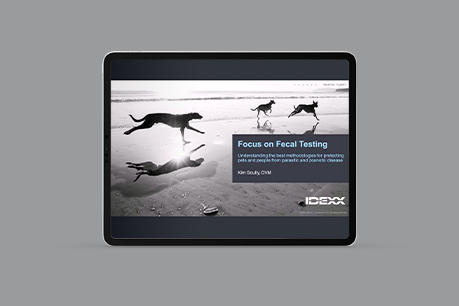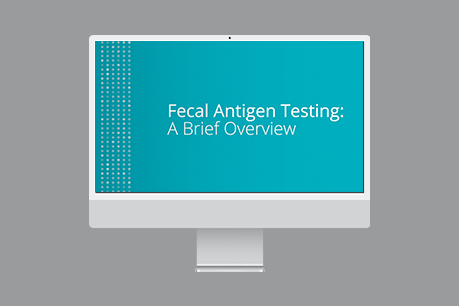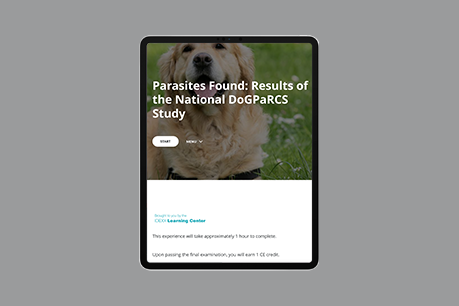Fecal Dx antigen testing
The importance of fecal testing.

What makes fecal testing so important?
Parasites are an ongoing hazard to the health of both pets and sometimes their human family members. Pets can be at risk simply by being outside. Some parasites can burrow into a pet’s feet or skin. Pets can also swallow parasites while grooming, nursing, or eating contaminated soil or feces. Regular fecal testing can help detect parasites sooner, which means earlier treatment and better outcomes.
Fighting the war on parasites.
Share CAPC recommendations with pet parents.
When clients understand the dangers parasites can pose to their pets, and even to their family members, they are more likely to be in favour of regular parasite screenings.
Recommend year-round, broad-spectrum parasite control.
CAPC recommends fecal screening at least twice a year for adult pets but at least four times during the first year of life.4
Diagnose and treat infections earlier with Fecal Dx antigen testing.
Fecal antigen testing can identify infections that can be missed by other methods. CAPC recommends including fecal antigen testing to diagnose infections, treat patients earlier, and reinforce the proper use of parasite-control products.4
Dog parks are a parasite playground.
A nationwide dog park study5 revealed the high risk of exposure to intestinal parasites, even among healthy, well-cared-for dogs. This study was conducted in 30 metropolitan areas and included 288 dog parks. What was the result?

of dog parks tested positive for an intestinal parasite.

1 in 5 dogs tested positive for intestinal parasites.

of dog parks tested positive for hookworms, roundworms, or whipworms.
Fecal Dx antigen testing is an effective way to catch parasite infections missed by the microscope, and even in dogs and cats receiving preventives. Read the study >
Webinars
Our educational resources include a variety of courses, webinars, and videos about the importance and benefits of fecal testing.

Focus on Fecal Testing

Fecal Antigen Testing: A Brief Overview

Why Poop Matters—Fecal Dx and Parasite Testing

Parasites Found: Results of the National DoGPaRCS Study
Complete this form to have an IDEXX sales representative contact you
References
- Companion Animal Parasite Council. General guidelines for dogs and cats. September 16, 2022. Accessed February 19, 2024. www.capcvet.org/guidelines/general-guidelines
- Elsemore DA, Geng J, Cote J, Hanna R, Lucio-Forster A, Bowman DD. Enzyme-linked immunosorbent assays for coproantigen detection of Ancylostoma caninum and Toxocara canis in dogs and Toxocara cati in cats. J Vet Diagn Invest. 2017;29(5):645–653. doi:10.1177/1040638717706098